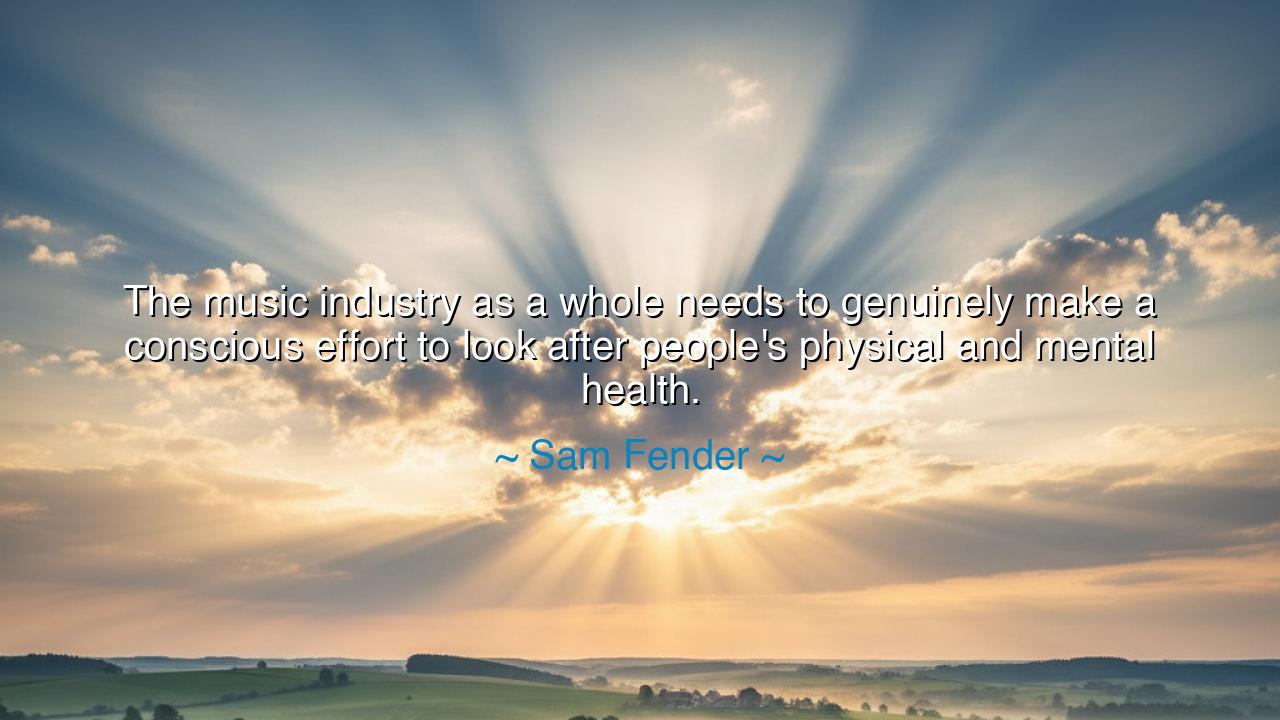
The music industry as a whole needs to genuinely make a conscious
The music industry as a whole needs to genuinely make a conscious effort to look after people's physical and mental health.






“The music industry as a whole needs to genuinely make a conscious effort to look after people’s physical and mental health.” — thus spoke Sam Fender, the modern troubadour, whose songs echo with both power and pain, whose voice carries not only melody but truth. In this declaration, he speaks not as a celebrity, but as a seer — one who has looked upon the shining towers of fame and seen the shadows beneath them. His words are a call for compassion within an art that was meant to heal, yet too often consumes its own. For in the rhythm of the music world, where applause drowns out silence and success demands sacrifice, health — both physical and mental — has become the forgotten harmony.
In these words, Fender addresses not just the artists, but the architects of the entire music industry — the producers, the managers, the labels, the audience itself. He asks for a “conscious effort”, for awareness made deliberate, for empathy turned into action. For though music has the power to soothe the soul, those who create it often suffer unseen. The stage lights that dazzle the world can blind those who stand within them. Behind every song lies a human being — weary, flawed, fragile. The heart that pours beauty into the world is also one that bleeds. Fender’s plea is thus both moral and spiritual: that the industry remember the human behind the art, and treat the artist not as a commodity, but as a soul.
The truth of his words can be found in the sorrows of history. How many have fallen in the pursuit of the song? Think of Amy Winehouse, whose voice carried the ache of a generation, yet whose pain went unheard until it was too late. Think of Kurt Cobain, whose genius burned bright and fast, devoured by the very world that worshiped him. Think of Avicii, who gave joy to millions, yet could not find peace within himself. These were not weak souls — they were warriors of art, wounded by a culture that prizes profit over personhood. Their fates stand as monuments to a tragedy: that in the realm of music, where healing should reign, suffering has been normalized.
The ancient poets and musicians knew better. In Greece, the art of music was sacred — born of the god Apollo, who ruled both medicine and melody. To them, the lyre was not an instrument of commerce, but of balance. The one who played it healed both himself and others. Likewise, among the indigenous tribes of the world, music was a medicine of the spirit — sung in community, never in isolation. But in our modern age, the song has been torn from the soul and sold as spectacle. The musician, once a healer of hearts, has become a laborer of entertainment. Fender’s wisdom, then, is a call to restore music to its original holiness — to reunite art with wellness, melody with meaning, and success with humanity.
His mention of both physical and mental health reminds us that the body and mind are twin vessels, each bearing the weight of performance. Endless tours, sleepless nights, the chase for perfection — these are the chains that silence even the brightest voices. A singer may lose his voice from exhaustion, but far more devastating is when he loses his will to sing. To heal the industry is to create balance: to give rest where there is strain, care where there is burnout, and understanding where there is despair. The industry must learn that care is not weakness, but strength — that the soul of music itself depends upon the souls of those who create it.
And yet, the burden does not rest on the industry alone. We, the listeners, must also awaken. Each time we demand more without compassion, each time we consume without gratitude, we contribute to the pressure that breaks the artist. The audience must learn to listen not only to the melody, but to the silence behind it — the silence that asks for kindness, patience, and respect. Support the musician, not only when they shine, but when they falter. For as Fender teaches, art cannot thrive where the artist suffers, and the health of culture depends upon the well-being of its creators.
The lesson, then, is one of empathy and renewal. Let those who lead the music world remember that the art they profit from was born from the human heart. Let them build systems that protect rather than exploit, that nourish rather than drain. And let every artist remember that their worth lies not in the chart or the crowd, but in their wholeness. True music arises from peace, not pain — from balance, not burnout.
So, my children of the song, carry Sam Fender’s words as sacred counsel: guard your health as fiercely as your talent, and demand of your world not only applause, but understanding. For the music of the world depends not on sound alone, but on the beating hearts that create it. And when the industry learns to protect those hearts, the song of humanity will rise again — not in anguish, but in harmony.






AAdministratorAdministrator
Welcome, honored guests. Please leave a comment, we will respond soon